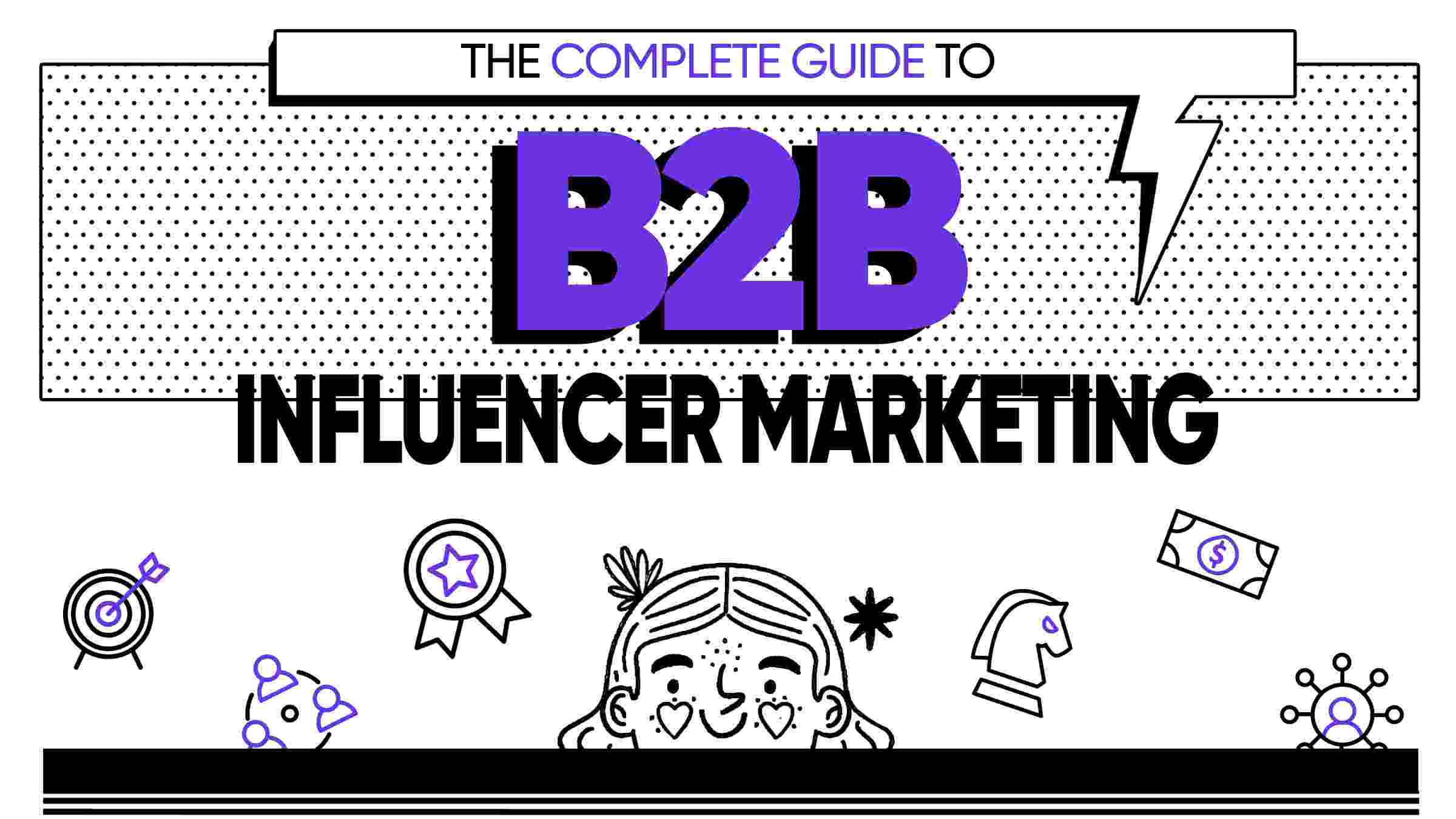B2B Influencer Marketing Complete Guide in 2024

Unlock the Power of Influencer Marketing Today!
Elevate your B2B brand with Ninjapromo's expert services. Boost engagement, reach, and conversions – seize the opportunity now! Click Here To Schedule Your Free Consultation Now
What is B2B Influencer Marketing?
B2B influencer marketing is a strategic approach that utilizes influential individuals or thought leaders within a specific industry to promote products or services to other businesses. It is a specialized form of influencer marketing tailored for B2B companies.
Traditional advertising methods often struggle to establish trust and credibility in the B2B marketing realm. B2B influencer marketing addresses this challenge by partnering with industry experts, executives, or recognized professionals. These influencers have built authority and a substantial online presence, including social media, blogs, podcasts, or speaking engagements, through which they share valuable insights and industry trends.
Beyond reach and awareness, B2B influencer marketing can drive lead generation, customer acquisition, and influence purchasing decisions. By aligning with the right influencers and cultivating meaningful relationships, B2B companies tap into word-of-mouth marketing, peer recommendations, and social proof to drive business growth.
B2B influencer marketing leverages influential individuals within an industry to promote products or services to other businesses. It enables B2B brands to establish credibility, expand their reach, and drive business results in the competitive B2B landscape.
What is the difference between influencer marketing in B2B and B2C?
B2B (business-to-business) and B2C (business-to-consumer) influencer marketing strategies exhibit notable differences due to the distinct characteristics of their target audiences and marketing objectives.
- Target Audience: B2B influencer marketing aims to engage businesses, focusing on decision-makers within organizations. This involves collaborating with industry experts, executives, or professionals who hold sway over business-related choices. In contrast, B2C influencer marketing targets individual consumers, appealing to a wider consumer base. The primary distinction lies in the intended recipients of the marketing efforts. B2B strategies seek to capture the attention and interest of key decision-makers, whereas B2C approaches aim to resonate with individual consumers. While the fundamental principles of influencer marketing apply to both B2B and B2C, successful execution requires adapting strategies to align with the specific characteristics and preferences of each target audience.
- Decision-Making Process: B2B purchases typically involve a longer, more complex decision-making process compared to B2C transactions. B2B influencer marketing aims to educate, provide insights, and assist in the decision-making journey by leveraging the expertise of influencers. In contrast, B2C influencer marketing often prioritizes creating emotional connections, brand affinity, and immediate purchase intent.
- Content Approach: B2B influencer marketing content tends to be more informative, educational, and industry-focused. It emphasizes thought leadership, expert opinions, and case studies to address business challenges and showcase the value of products or services. B2C influencer marketing content is often more lifestyle-oriented, highlighting personal experiences, product endorsements, and entertainment value to resonate with consumers’ emotions.
- Relationship Duration: B2B influencer marketing often involves longer-term relationships with influencers due to the ongoing nature of business relationships and the need for consistent thought leadership. B2C influencer campaigns may have shorter-term collaborations or one-off partnerships for specific product launches or promotions.
- Metrics and KPIs: B2B influencer marketing focuses on metrics aligned with business objectives, such as lead generation, sales conversions, customer retention, and brand reputation. B2C influencer marketing may prioritize metrics like reach, engagement, social media following, and brand awareness.
While both B2B and B2C influencer marketing harness the power of influencers, they differ in target audience, decision-making processes, content approach, relationship duration, and metrics. Understanding these distinctions is crucial for developing effective influencer marketing strategies and achieving success in the respective B2B and B2C landscapes.
Benefits of Leveraging Influencers in Your B2B Marketing Strategy
Integrating influencers into your B2B marketing strategy offers numerous advantages that can significantly impact your success.
Here are the key benefits of utilizing influencers in your B2B marketing efforts:
- Enhanced Credibility and Trust: Partnering with influential B2B experts and thought leaders enhances your brand’s credibility. Their industry authority and expertise position them as trusted sources of information. When they endorse your products or services, it builds trust with your target audience, boosting their confidence in your offerings.
- Expanded Reach and Targeted Exposure: B2B influencers have cultivated substantial and engaged audiences within specific industries. Collaborating with them enables you to tap into their established networks, extending your brand’s reach to a targeted and relevant audience. This targeted exposure ensures that your message reaches the right people, increasing the likelihood of attracting quality leads and driving conversions.
- Authentic Content Creation: B2B influencers possess deep industry knowledge and insights. By partnering with them, you gain access to authentic and compelling content that resonates with your target audience. Influencers can provide unique perspectives, share valuable insights, and showcase the value of your products or services. This authentic content establishes your brand as a trusted authority, driving engagement and fostering meaningful connections with potential customers.
- Relationship Building and Networking Opportunities: Collaborating with B2B influencers facilitates valuable relationships and opens doors to networking opportunities. These influencers often have extensive connections with industry professionals, decision-makers, and potential partners. Through influencer partnerships, you can leverage their networks, expanding your business reach and forging valuable connections that may lead to future collaborations and business growth.
- Improved Online Visibility and SEO: Influencer collaborations significantly enhance your brand’s online visibility. When influencers mention or promote your brand, it increases your online presence and exposes you to their engaged audience. This exposure leads to increased brand visibility, improved search engine rankings, and greater organic traffic to your website. Additionally, influencer partnerships often generate valuable backlinks and social media mentions, boosting your SEO efforts.
- Measurable Results and ROI: B2B influencer marketing campaigns can be effectively measured and evaluated. By strategically partnering with influential B2B experts, you can amplify your brand’s message, engage your target audience, and drive business growth in the competitive B2B landscape.
How B2B Influencer Marketing Works
Understanding that B2B influencer marketing differs from B2C influencer marketing is crucial. Collaborating with B2B influencers involves greater complexity and collaboration, beyond mere product giveaways or unboxing videos typically seen in B2C influencer marketing.
In this realm, you must consider various types of influencers beyond social media stars, including podcasters, authors, keynote speakers, entrepreneurs, bloggers, researchers, organizations, and thought leaders.
A B2B influencer marketing strategy often entails a more interactive and mutually beneficial approach, rather than a straightforward sponsorship for a video. Both parties aim to gain exposure and recognition, offering ample opportunities to develop unique ideas that highlight the strengths of each party involved in the partnership.
10 Metrics to Measure B2B Influencer Marketing
In the realm of B2B influencer marketing, accurate measurement metrics are indispensable for gauging the effectiveness and impact of campaigns. By delving into the top 10 metrics used to assess B2B influencer marketing efforts, businesses can unlock valuable insights and refine their strategies for maximum success.
Partner with Ninjapromo and harness influencers to skyrocket your brand’s growth. Don’t miss out on this game-changing marketing strategy!
- Clearly Define Key Performance Indicators (KPIs): Start by identifying the specific goals you want to achieve through your B2B influencer marketing campaign. Common KPIs include lead generation, website traffic, brand awareness, engagement metrics, conversions, and revenue.
- Establish Baseline Metrics: Before launching your influencer marketing initiatives, establish a baseline for the selected KPIs. This will serve as a benchmark to measure the impact of your campaign accurately.
- Implement Tracking Mechanisms: Set up robust tracking mechanisms to monitor the performance of your B2B influencer marketing efforts. Utilize tools like Google Analytics, social media analytics, and URL tracking parameters to capture relevant data.
- Track Reach and Impressions: Monitor the reach and impressions generated by your influencer content across various channels. Measure the number of people exposed to your content, as well as the potential impressions it receives.
- Analyze Engagement Metrics: Assess the engagement metrics associated with your B2B influencer marketing campaign, including likes, comments, shares, retweets, and mentions. These metrics provide insights into audience involvement and the effectiveness of your content.
- Measure Website Traffic and Referrals: Use web analytics tools to track the volume and quality of traffic generated by influencer-driven campaigns. Monitor referral sources and compare the conversion rates of influencer-driven traffic to other channels.
- Evaluate Lead Generation and Conversion Rates: Determine the number of leads generated through your B2B influencer marketing activities. Analyze the conversion rates and customer acquisition cost (CAC) associated with influencer-generated leads to assess the campaign’s ROI.
- Assess Brand Sentiment and Perception: Monitor brand sentiment and perception within the target audience following influencer collaborations. Analyze social media sentiment analysis tools and customer feedback to evaluate the impact on brand reputation.
- Calculate Return on Investment (ROI): Calculate the ROI of your B2B influencer marketing campaign by comparing the campaign’s costs to the financial gains achieved. Consider both direct and indirect benefits, such as increased brand equity and customer lifetime value.
- Iterate and Optimize: Continuously monitor and analyze the data collected to identify areas for improvement. Refine your strategies, select the most effective influencers, and optimize your campaigns based on the insights gained from the measurement process.
These structured steps to measure the impact of your B2B influencer marketing efforts, you can effectively assess the performance and optimize your campaigns for optimal results.
8 Steps to Building an Effective B2B Influencer Marketing Strategy
In today’s competitive B2B landscape, influencer marketing has emerged as a powerful strategy to connect with target audiences and drive business growth. Leveraging the influence and expertise of key industry figures can significantly enhance brand credibility and generate valuable leads. To successfully harness the potential of B2B influencer marketing, consider the following steps:
- Define Your Goals and Target Audience: Begin by clearly outlining your marketing objectives and identifying the specific audience you want to reach. Understand their pain points, interests, and preferred platforms for engaging with influencers.
- Identify Relevant B2B Influencers: Conduct thorough research to discover influencers who have a strong presence and credibility within your industry. Look for thought leaders, industry experts, and professionals who align with your brand values and resonate with your target audience.
- Build Authentic Relationships: Authenticity is key in influencer marketing. Instead of approaching influencers with a purely transactional mindset, focus on building genuine relationships. Engage with them through meaningful interactions, share their content, and provide value to their networks.
- Craft Compelling Content: Collaborate with influencers to develop engaging content that showcases your brand’s expertise, products, or services. Leverage their unique perspectives and storytelling abilities to create compelling narratives that resonate with your target audience.
- Leverage Multiple Channels: Utilize a mix of channels to amplify your influencer-generated content. These can include blog posts, social media platforms, webinars, podcasts, or industry events. Tailor the content for each channel to maximize reach and engagement.
- Measure and Analyze Results: Use data analytics tools to track the performance of your influencer marketing campaigns. Monitor metrics such as engagement, reach, website traffic, lead generation, and conversions. This data will provide insights into the effectiveness of your strategy and help refine future campaigns.
- Nurture Ongoing Relationships: Building long-term relationships with influencers is crucial for sustained success. Continuously engage with them, offer mutual support, and explore new opportunities for collaboration. This will strengthen your brand’s position within the industry and foster a community of advocates.
- Stay Compliant and Transparent: Ensure your influencer partnerships comply with relevant regulations and guidelines. Clearly disclose any sponsored content to maintain transparency and trust with your audience.
These steps, you can develop a robust B2B influencer marketing strategy that elevates your brand, expands your reach, and drives tangible business results. Remember, the key lies in building authentic relationships, crafting compelling content, and continuously refining your approach based on data-driven insights.
3 Examples of B2B Influencer Marketing Campaigns
In the dynamic landscape of B2B marketing, influencer collaborations have emerged as powerful strategies that bridge authenticity and industry expertise. Examining real-world implementations provides invaluable insights into the effectiveness of B2B influencer marketing campaigns. Here, we delve into three notable examples that highlight the transformative impact of this approach.
- Tech Innovators Unite: In a collaborative effort to drive the adoption of cutting-edge technology solutions, a B2B software company partnered with a renowned technology influencer. Through a series of in-depth webinars, insightful blog posts, and joint panel discussions at industry events, the influencer lent their expertise to demystify complex software functionalities. The result was a campaign that not only increased brand credibility but also facilitated meaningful conversations within the tech community.
- Solving Industry Challenges: A leading B2B consultancy sought to position itself as a thought leader in the supply chain management sector. To achieve this, they collaborated with a respected supply chain expert and academician. The influencer contributed to whitepapers, video lectures, and exclusive online workshops that addressed pertinent challenges faced by professionals in the field. By offering practical solutions and unique perspectives, this campaign not only garnered attention but also positioned the consultancy as a go-to resource.
- Empowering Employee Advocacy: A multinational B2B manufacturing company recognized the untapped potential of its internal subject matter experts. Leveraging the voices of their engineers and product designers, they created a campaign showcasing real professionals behind their innovations. These in-house influencers shared their expertise through articles, videos, and live Q&A sessions. The campaign not only bolstered the company’s authenticity but also resonated deeply with their audience, fostering trust and genuine engagement.
These examples underscore the diverse applications of B2B influencer marketing, from establishing thought leadership to fostering internal advocacy. By aligning with influencers who possess genuine authority and resonance within specific industries, B2B companies can harness the power of collaboration to forge lasting connections, elevate brand credibility, and navigate the evolving landscape of modern business.
How to Identify the Perfect B2B Influencer for Your Influencer Marketing Strategy
In crafting a powerful influencer marketing strategy for the B2B sector, one crucial element is identifying the ideal influencers who can authentically align with your brand’s values and objectives. Through the following eight key points, we will explore actionable steps to pinpoint the perfect B2B influencers, ensuring an impactful and fruitful collaboration for your marketing endeavors.
Experience the full potential with Ninjapromo’s tailored solutions. Witness remarkable ROI – act now and revolutionize your marketing efforts.
- Define Your Objectives: Start by clarifying your B2B influencer marketing goals. Determine whether you seek to increase brand awareness, generate leads, or enhance credibility within your industry. Having clear objectives will guide your search for the right influencers who align with your brand’s mission.
- Know Your Target Audience: Understand your B2B target audience inside-out. Analyze their preferences, pain points, and online behavior to identify influencers who can genuinely resonate with them. Look for influencers who have a strong following among your target demographic.
- Relevance and Expertise: Seek influencers whose expertise aligns with your niche or industry. The influencer’s content should demonstrate a deep understanding of your sector and provide valuable insights to their audience. This alignment will ensure that your collaboration feels authentic and credible.
- Check Content Quality: Review the influencer’s past content to gauge its quality, relevance, and authenticity. High-quality content that adds value to their followers is more likely to be well-received and can positively impact your brand’s reputation.
- Brand Alignment: Ensure that the influencer’s values and voice align with your brand’s image and message. Consistency between your brand identity and the influencer’s persona will foster trust and credibility among their audience, leading to a more successful campaign.
- Monitor Reputation: Conduct thorough research on potential B2B influencers to ensure they maintain a positive online reputation. Any association with influencers who have a history of controversial behavior could harm your brand’s reputation.
- Negotiate Clear Terms: Once you’ve identified the ideal B2B influencer, negotiate clear terms and expectations for the collaboration. Outline deliverables, timelines, compensation, and any other relevant details to avoid misunderstandings.
- Track and Measure Results: Monitor the performance of your influencer marketing campaign closely. Track key performance indicators (KPIs) such as website traffic, lead generation, and brand mentions to assess the impact of the collaboration. Use these insights to refine future influencer partnerships.
Influencer Marketing Trends in 2024
In 2024, the landscape of marketing continues to evolve, and the utilization of influencers as a strategic tool gains even greater significance in the realm of B2B. Within this diverse and dynamic environment, new trends are emerging that shape the future of influencer marketing.
Forward-thinking companies recognize that a successful partnership with influencers can elevate their brand’s authority and influence to new heights. In this context, several key influencer marketing trends stand out for B2B in 2024:
- Micro- and Niche Influencers: In the B2B arena, the emphasis on scale gives way to the importance of an audience genuinely interested in a specific niche. Micro- and niche influencers possess deep expertise and authority in narrow fields, making them valuable partners for companies targeting a precise audience.
- Long-Term Partnerships: Instead of one-off collaborations, businesses are increasingly favoring the establishment of long-term relationships with influencers. This approach enables the building of deep and trusting connections and allows for more organic brand integration within content.
- Visual and Video Content: Visual and video formats remain paramount for B2B influencer marketing. Webinars, interviews, product demonstrations, and expert reviews on platforms like YouTube and LinkedIn facilitate more profound audience engagement.
- Value and Expertise: Influential figures who share valuable insights and expert opinions are highly sought after. Companies are more frequently selecting partners who can enrich their audience with unique knowledge and insights.
- Authenticity and Transparency: Both consumers and business partners value authenticity. Influencers who endorse only the products and services they genuinely believe in forge a deeper connection with their audience.
- Analytics and Measurement: In 2024, investments in influencer marketing will be meticulously analyzed and assessed. Companies will strive to measure ROI more accurately, using various metrics such as audience engagement, conversions, and brand recognition.
These trends underscore that influencer marketing in the B2B sphere is currently at the peak of its effectiveness and has become an integral part of many companies’ strategies. Understanding these trends will help organizations successfully adapt to evolving dynamics and create stronger connections with their target audience.
Conclusion:
Incorporating influencers into your B2B marketing strategy provides significant benefits that can greatly impact the success of your campaigns. Partnering with industry experts and thought leaders enhances your brand’s credibility, expands your reach, fosters authentic content creation, facilitates relationship building, improves online visibility, and delivers measurable results.
At Ninjapromo, a leading marketing agency, we specialize in influencer marketing services. Our team of professionals can help you develop and implement an effective influencer marketing strategy tailored to your B2B goals. By leveraging our expertise and resources, you can maximize the potential of influencer collaborations and drive significant business growth.
Whether you are looking to enhance your brand’s reputation, reach a targeted audience, or drive conversions, Ninjapromo is here to support you in harnessing the power of influencers for your B2B marketing success. Contact us today to learn more about how our influencer marketing services can benefit your business.
Discover B2B Influencer Magic!
Let Ninjapromo connect you with top influencers in your industry. Unleash unparalleled authenticity and credibility for your brand – claim your success!
Did You Like This Article?
Our Other Articles












- How NinjaPromo works
- How you can do marketing at scale better, faster and cheaper
- How we’re different from agencies, freelancers and in-house marketing teams (hint: we’re 15x faster than hiring!)
- The most suitable subscription plan for your needs











